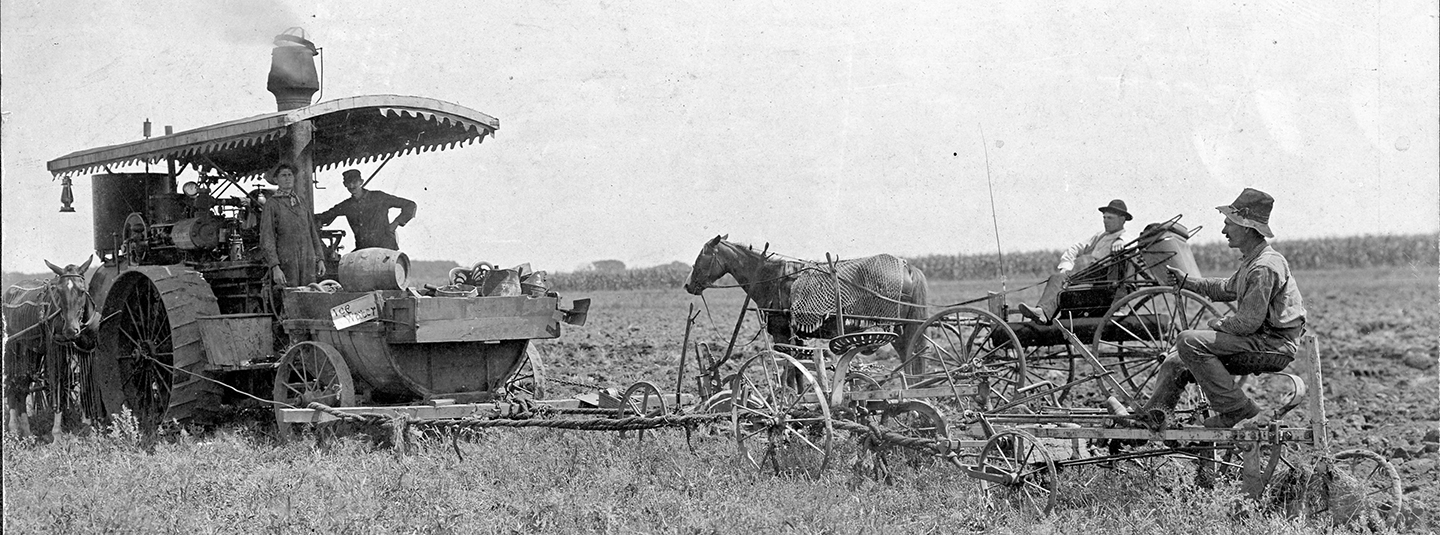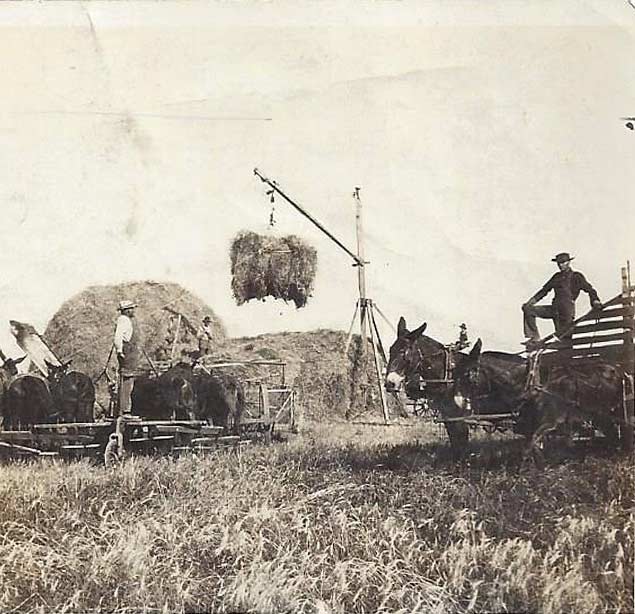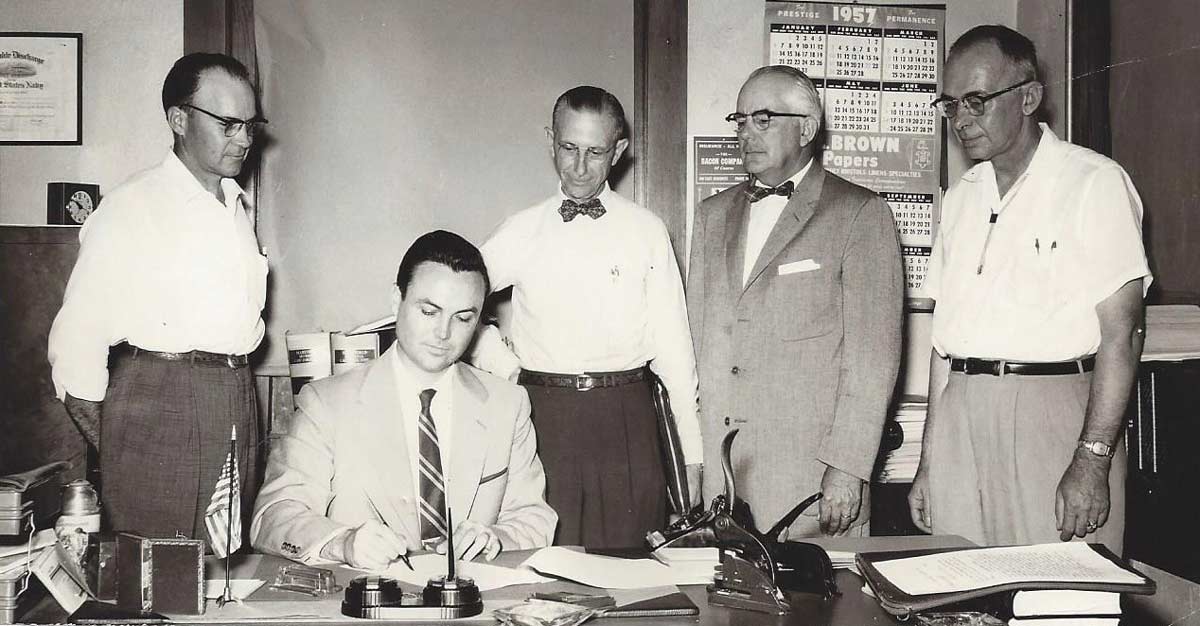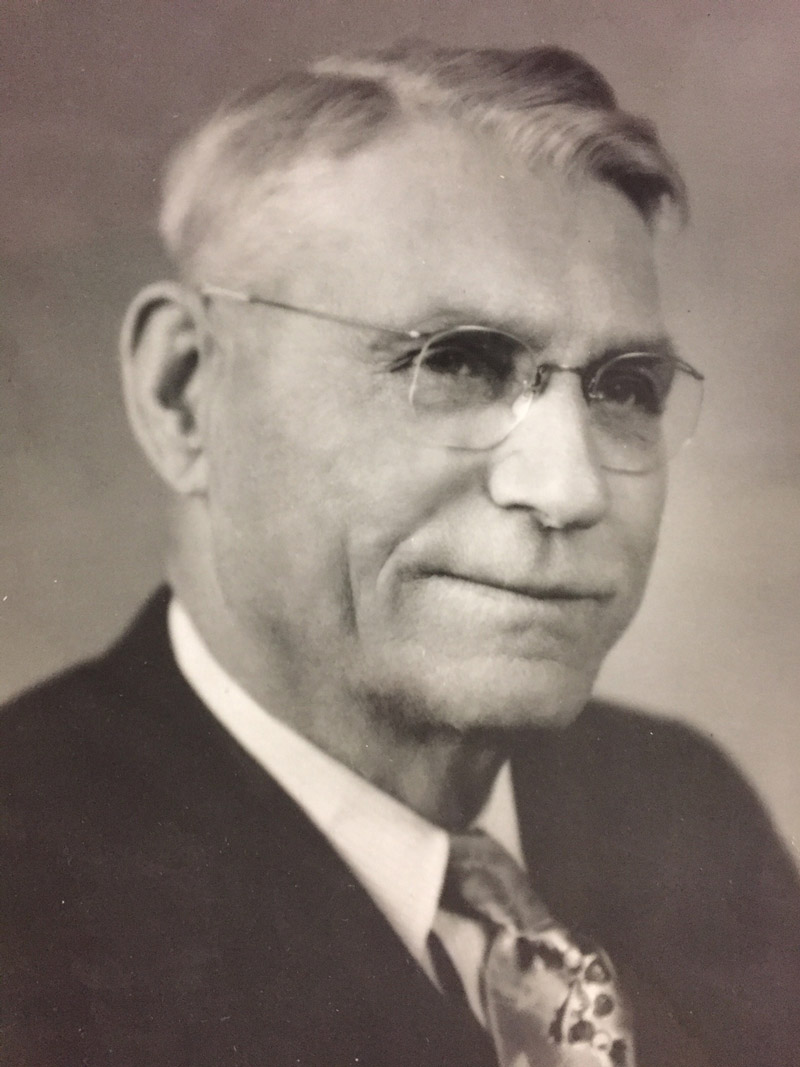A Farmer's Vision | The Schowalter Foundation
The far-reaching impact of the Schowalter Foundation
From his cluttered rolltop desk in his Newton, Kansas, home, Jacob A. Schowalter often wrote out letters to nonprofits, churches and Christian institutions, bestowing sizeable monetary gifts to the organizations.
He’d use new parchment for these letters – a rare indulgence for Jacob, who was a frugal man. When he wrote out speeches, poems, and Sunday school lessons, he often used the backs of used envelopes or scrap paper.
Throughout his life, Jacob spent little on his own comforts, and instead, often prioritized charitable giving over much else.
By the time he died in 1953 at the age of 73, Jacob had amassed an estate of over $1 million – most of which would be used to establish the Schowalter Foundation. Over the past 70 years,this foundation has provided more than $27 million in charitable distributions to Anabaptist-affiliated organizations and local ministries.
The Schowalter brothers plow fields on the family farm near Halstead, Kansas. Photo courtesy of the Mennonite Library and Archives, Bethel College (Kansas).
SPRAWLING ESTATE
The Schowalter Foundation, based out of North Newton, Kansas, is unique. Its assets consist primarily of farmland owned and operated by the foundation and farmed by local farmers, and investment securities managed by Everence® Trust Company.
In 1903, at the age of 24, Jacob inherited 80 acres of farmland in Halstead, Kansas. He bought another 80 acres from one of his siblings, and soon thereafter, bought another 160 acres in Bucklin, Kansas. This was the beginning of what would become the sprawling Schowalter estate. By the time Jacob died, he owned land in six counties across Kansas, as well as some in Oklahoma and Paraguay.
J.A. Schowalter's "Headed Grain Stacker" invention, a portable hoist that allowed large heads of grain to be moved from wagons.
This became especially true during the Great Depression, when dust bowl conditions struck Kansas and Oklahoma, and many farmers were desperately looking to sell their land. Rather than letting banks foreclose the farms, Jacob bought large tracts and rented it back to the farmers for a fair price.
“He had a strong desire to keep family farms alive,” said Diane Yoder, President of the Schowalter Foundation.
Today, many of those family farms are still operating, supporting the third and fourth generations of the original families who worked the land.
The landowner portion of the farm income is used to fund the Schowalter Foundation and its work to support missions, foreign relief, churches, Christian schools and institutions.
“Jacob wanted his estate to be an ongoing, viable opportunity for farm families,” Diane said. “At the same time, he wanted his estate to continue his legacy of charitable support to the causes that mattered most to him.”
Judge Sam Sturm (seated) signs the order to close the J.A. Schowalter estate, the proceeds of which helped establish the Schowalter Foundation.
CREATIVE GIVING
When Jacob conceived the idea for the foundation, there likely was no existing model to follow, said Dave Warren, Vice President of Asset Management at Everence and Schowalter Foundation board member.
Bill Hartman, who also serves on the foundation’s board and is Vice President of Organization and Fiduciary Services at Everence, added, “Jacob used his passion and the tools and assets that were at his disposal to create a unique and significant impact on the world.”
Jacob’s will stated that his estate of just over $1 million be managed by three church conferences – The Mennonite Church and The General Conference Mennonite Church (which merged and became Mennonite Church USA) and the Church of God in Christ Mennonite. Each conference was instructed to appoint two trustees, who would steward and distribute the foundation’s funds.
In 2017, the foundation became a supporting organization of Everence Foundation, which allows it to operate independently, while benefiting from resources and expertise from Everence.
Everence and the Schowalter Foundation have a unique relationship, as Everence serves the foundation on “both sides,” said Dave. Everence manages investment securities that generate some of the income for the foundation through socially responsible investing strategies.
The Schowalter Foundation board then determines the charitable recipients of the funds. Jacob’s writings and will provide the basis for making these decisions.
“The board is very intentional about supporting the same organizations and causes reflected in Mr. Schowalter’s will,” Diane said.
ONE MAN’S IMPACT
Today, the Schowalter Foundation’s funds are used to support mission work, peace, social and welfare work, international or ministerial students, and more.
Jacob A. Schowalter
At Anabaptist Mennonite Biblical Seminary (AMBS) in Elkhart, Indiana, the Schowalter Foundation has made it possible for hundreds of students to pursue their degrees through scholarships and financial support, said Mary Ann Weber, Director of Enrollment at AMBS.
In 2021, Melika Hershberger, a Master of Divinity student at AMBS, received a full tuition scholarship that was partly funded through the Schowalter Foundation.
Before receiving the scholarship, Melika wasn’t sure that she could go to seminary. She felt a strong pull toward pastoral ministry work, but she had two college-aged kids – how could her family afford three tuitions at once?
“[The scholarship] affirmed my call,” Melika said. “It was really pivotal in taking that last step to come to seminary.”
Funds from the Schowalter Foundation have global impact as well.
Linda Shelly, Regional Director for Latin America at Mennonite Mission Network (MMN), has seen Schowalter Foundationgrants used for a wide variety of projects across Latin America.
In Guatemala, the Schowalter Foundation has funded some of MMN’s work to support Kekchi women develop their gifts for ministry. And in the Chaco province of Argentina, MMN uses Schowalter grants to help support Centro Educativo Sa aten (Qom Knowledge Educational Center) and provide access to media, education and religious materials developed with and for the Indigenous Toba Qom people.
“It’s wonderful to be able to witness impact in the lives of people, along with seeing what partners are able to do in expanding their ministries with help from the Schowalter Foundation,” Linda said.
Across Africa, the Schowalter Foundation has funded projects that help Africa Inter-Mennonite Mission (AIMM) pursue its mission of bringing together African, North American and European Anabaptists to collaborate and accomplish work that supports education, agriculture and economic development in places like Burkina Faso, the Democratic Republic of the Congo and Angola.
The Schowalter Foundation’s support has been crucial in enabling AIMM to carry out these collaborative projects, which help facilitate ongoing ministry between different church partners, said Bruce Yoder, Co-executive Coordinator of AIMM.
“The Schowalter Foundation helps us meet our goal of doing collaborative ministry and building relationships,” Bruce said. “That’s key to AIMM’s identity.”
AN ONGOING LEGACY
Since its establishment in 1954, a year after Jacob’s death, the foundation has distributed more than $27 million in charitable donations to help organizations like AIMM, MMN and AMBS fulfill their missions.
“Now, the foundation is able to gift nearly $1 million a year in charitable distributions, which is the estate’s original value,” Diane said. “What a beautiful way to exponentially steward what God has given you.”
Jacob could have left his estate to a relative or a single charitable organization, but instead he chose to make a sizeable difference through his innovative approach to planned giving.
“He had such a desire to serve others and put his needs second to others,” said Diane, “and to leave a legacy that served not only those who farmed his land, but the organizations near to his heart.”
For those who may want to create a similar ongoing legacy, the Schowalter Foundation accepts gifts of land and other farm assets. Just like Jacob, individuals can see their assets provide a lasting impact of support for mission work, peace, social and welfare work, and ministry work both here in the U.S. and beyond.
“Mr. Schowalter’s unique approach to developing an ongoing legacy that has stretched far beyond his lifetime serves as a model,” said Diane. “Others can follow this inspirational legacy and create their own.”
